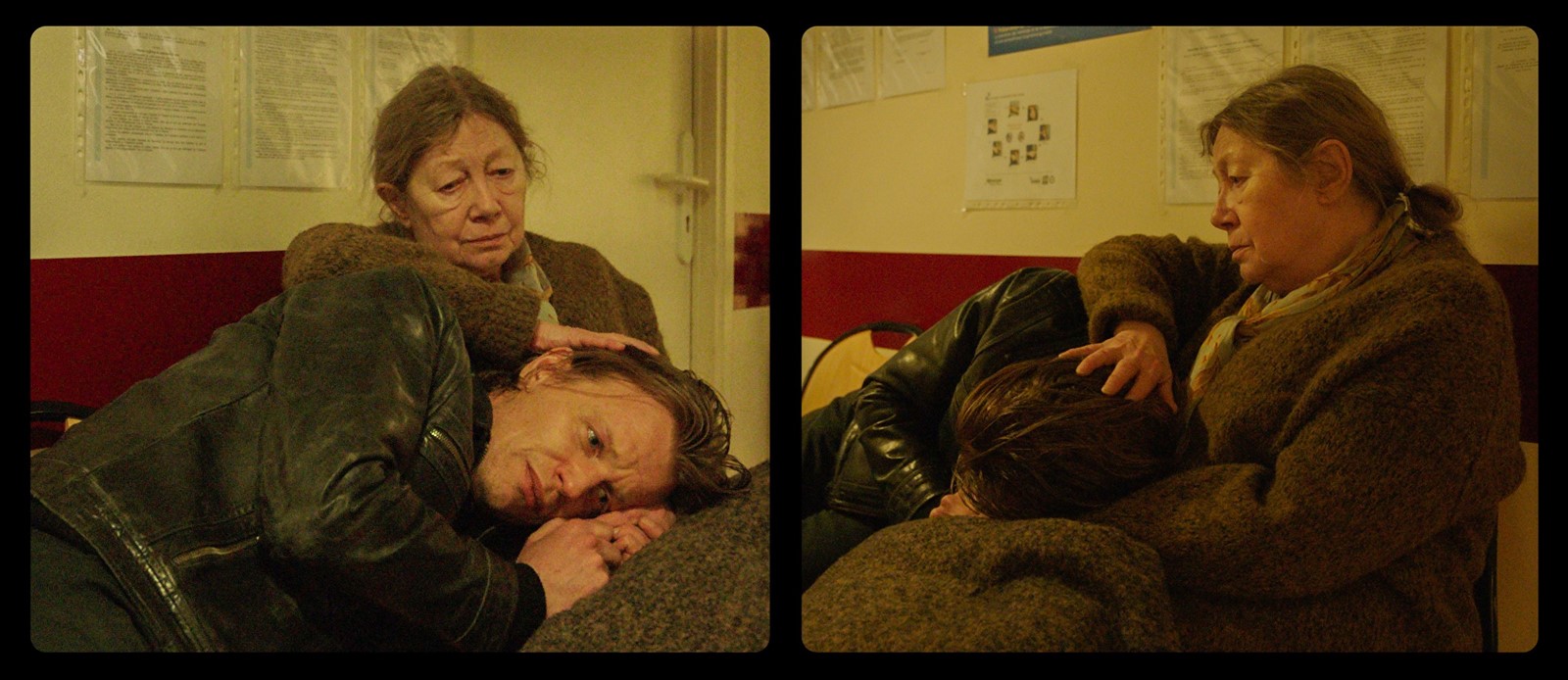At the age of 58, Gaspar Noé is still taking the kind of cinematic trips lesser filmmakers don’t come back from. In his sixth feature to date, Vortex, he casts French new wave legend Françoise Lebrun and Dario Argento (yes, that Dario Argento) as an unnamed elderly couple nearing the end of their lives in their Paris apartment. Lebrun’s character is living with Alzheimer’s; her husband, who suffers from a heart condition, dodders against the dying of the light by persuading his son (Alex Lutz) that all is well at home and secretly bunking off to his office to make calls to his mistress. In one sense, it’s a story that sits squarely in a recent trend for films – Amour, Relic, The Father – that deal with the subject of Alzheimer’s. But Noé, who has firsthand experience of the subject through his own mother, makes it his own by presenting the film almost entirely in split-screen.
In placing these two characters in their little prisons of subjectivity, he subtly positions his story as part of a career-long obsession with the outer limits of consciousness – only this time, he’s looking at the theme via the lens of old age, rather than hellish acid trips (Climax) or a drug dealer’s ghost (Enter the Void). In fact, the void very nearly struck back shortly before shooting began on this film, when Noé suffered a brain haemorrhage that left him hospitalised for three weeks at the end of 2020. For a director whose work often seems to converge in the fuzzy spaces between life and death, it could have been the moment he’s been training for all his life. And in a sense, aren’t we all.
We spoke with Noé and Lebrun about the film, which was made over five weeks in the locked-down early months of 2021. (Note: spoilers ahead)
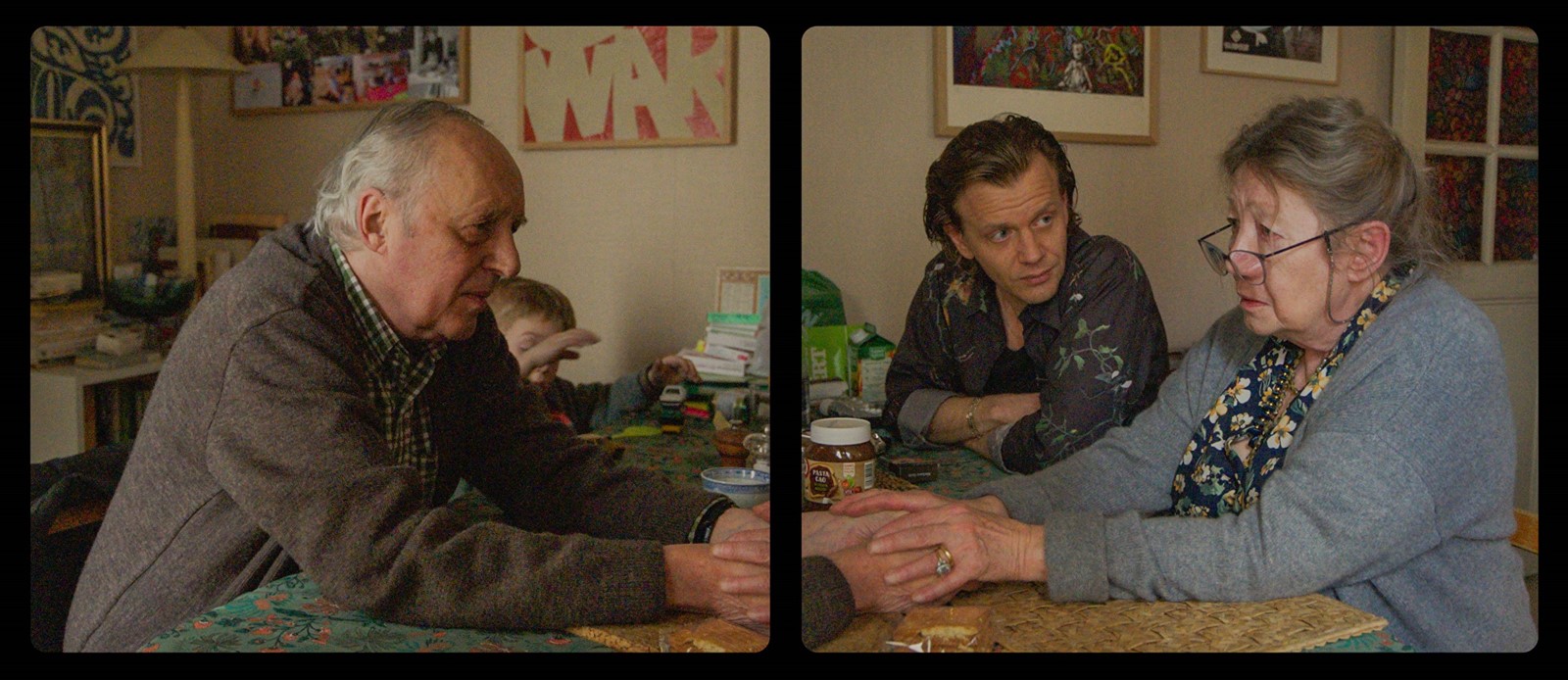
Alex Denney: Gaspar, your own mother was diagnosed with Alzheimer’s before she passed away. How much did you draw on personal experience for this film?
Gaspar Noé: It’s not based on my own story, but I know what it is to have a mother with Alzheimer’s. And it’s such a nightmare for the person [who has it] and also for the people around them. It’s a very simple disease that hits almost every family on this planet, and it’s still a kind of taboo, because I think that [many] people are more afraid of having Alzheimer’s than dying. Old age ain’t no place for sissies, like Bette Davis said.
AD: Do you think that films like Amour and The Father have played a part in unlocking those taboos?
GN: Yes. Especially since Amour, because in many ways it was the first movie on old age that was commercially successful. But old movies like [Vittoria De Sica’s] Umberto D make way for tomorrow, even when they’re not successful. I saw that movie when I was a kid and it really touched me. It’s like there was some kind of old-age misery that was rarely portrayed [on screen].
AD: How did you develop the idea for Vortex?
GN: During lockdown, my producers asked me if I had an idea for a movie that could take place in one apartment with just two or three characters, because it was impossible to shoot in the streets or in clubs. And I said yes. Everything happened very quickly. But the good thing is there was some kind of joyful energy in the filmmaking that was probably more powerful than the subject itself, because the [circumstances were] very sad, shooting in confinement with Covid masks in a very small apartment for five weeks.
AD: How was the film cast?
GN: Dario Argento I’ve known for the last 30 years and I knew he would be great, even if he’s never really acted [before]. And I was really lucky that Françoise [agreed] to do the movie, because she was also my first idea for the character. It was very improvised on the set – I just gave them ten pages of script, but they all agreed it was simpler not having any dialogue pre-written by me.
AD: Françoise, were you familiar with Gaspar’s work when he approached you about the film?
Françoise Lebrun: Not at all. No, I knew his reputation. I mean, who doesn’t? I’m not sure if I had met him before. We live in the same area in Paris, so maybe we have friends in common, but it was the beginning of the relationship.
“When someone is really confused, it’s very contagious and people around them get confused” – Gaspar Noé
AD: Did you know you’d be working with Dario from the outset?
FL: No. Gaspar told me he’d put my picture on his wall, and the next question was ‘who would be the husband?’ He hoped Dario could do it but Dario was preparing his own film, which was delayed because of Covid. So Gaspar went to Rome to propose the film and to show him [Noe’s 2015 film] Love. And Dario said, ‘Aha, yes!’ Because it’s quite a pornographic film in a way. And so he said, ‘I’ll do it, but I want to have a mistress!’
AD: That was his condition! Gaspar, Dario hasn’t really acted much before, has he?
GN: No, not at all. Mostly he enjoyed playing the killer’s hands [in his own films]. It’s funny, when you look on IMDb it always says, ‘Hands of the Killer, Dario Argento’. His hands are more famous than his face.
AD: Why did you want him for this role?
GN: Because he’s so funny, so talkative and joyful in many ways that when I was trying to figure out who could play the part, the first idea that came to me was him. I once saw him speak for one hour [at a screening of] The Phantom of the Opera. There was no time for the Q&A afterwards! Everyone was applauding, it was like seeing a great comedian on stage. I always wished I could do a one-hour introduction [to my films] without taking a single question. And I thought, if we put someone like that in front of the camera, you could do a take that lasts one hour and probably 50 minutes of it will be perfect.
AD: Françoise, Alex Lutz plays your son in the film, who is a recovering drug addict. Am I right in thinking Alex has worked mostly in comic films up until now?
FL: Alex has worked on mostly comic films up until [recently], but he made a very good film about a 70-year-old singer called Guy [in 2018], which was a new face for him in a way. And Gaspar told me he had chosen Alex because he looked so melancholic.
AD: Gaspar, Alex’s character really struggles to deal with his parents’ declining health, doesn’t he?
GN: Yeah. Until that moment he’s been the kind of ‘old baby’ that everyone had to take care of, and then suddenly the situation changes and he has to take care of his parents, especially his mother.
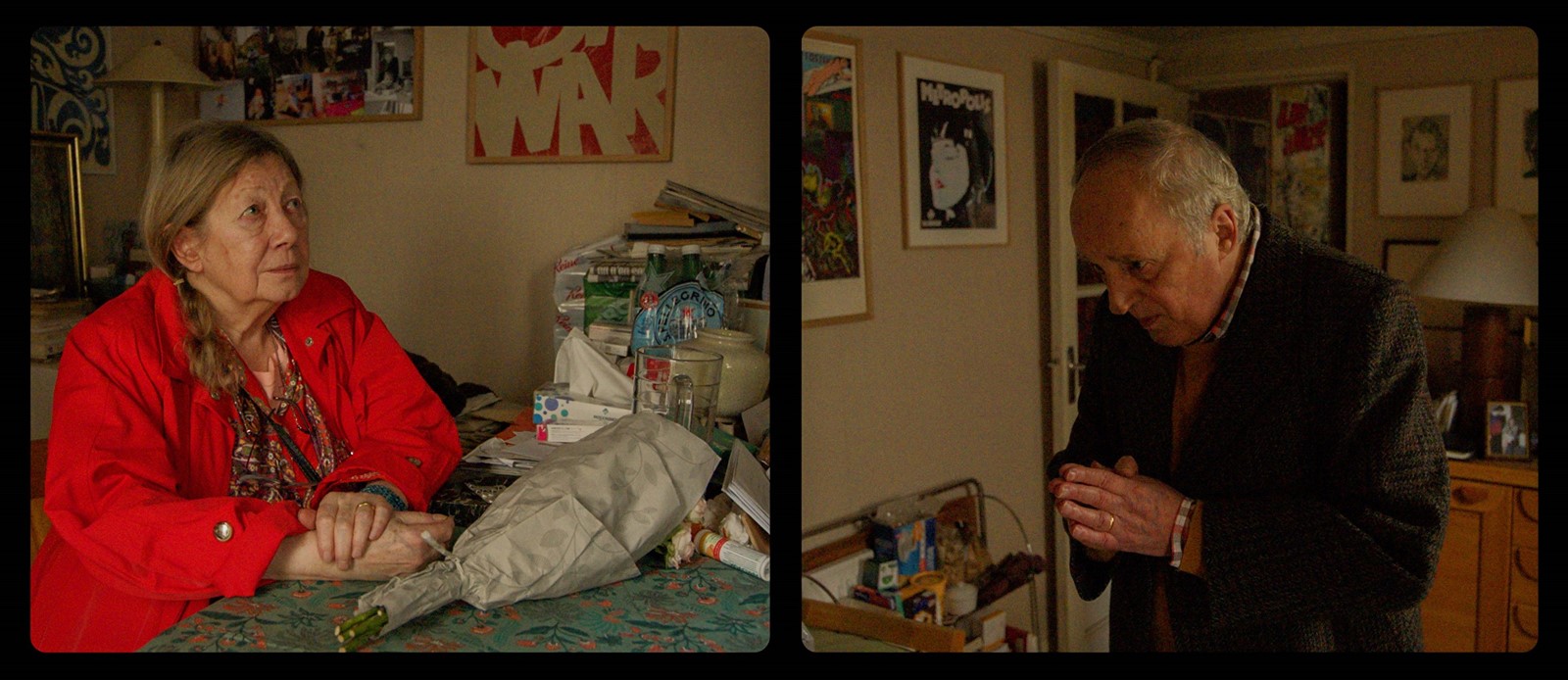
AD: In what ways do his experiences in the film mirror your own?
GN: Well I’ve been living in France for the last 40 years, so when my mother started losing her mind it was my father taking care of her. At the [end] it was really crazy, because she also had something called non-convulsive epilepsy, which means you have epileptic brain waves that turn your brain into a volcano and you cannot sleep. The last six months of her life were extremely painful and shaky; they looked like the end of my movie Climax when you had these dancers whose drinks had been spiked with LSD. It’s just like, you don’t know what reality is around you, and it’s just sheer terror or confusion. And when someone is really confused, it’s very contagious and people around them get confused.
AD: So much of the film is just a very ordinary lived experience for these characters, but there’s this constant background note of anxiety that the situation could blow up at any minute. Like when she puts the coffee on the hob to boil ...
GN: Yeah, it’s like a psychological horror movie. Because it’s a survival situation, but from the beginning, you know that everything is gonna go wrong. It’s more about how people experience their own tragedy.
AD: Françoise, you’ve been celebrated in your career for your facility with words but there’s very little dialogue here. Does that present its own kind of challenge?
FL: It was a relief.
AD: What, less lines to remember?
FL: No, no, I’m joking. It was another way of discovering something. Because with that kind of disease, only the present instant is important. So you react to everything, but only to that moment; you don’t project. There’s no judgement, no preconceived ideas. Nothing. Honestly. It’s just me, in the moment.
AD: Did you think a lot about what the character was like before she was ill?
FL: There are these old reflexes that [sometimes] come to her. When her husband has a heart attack, she calls her son and tells him to call the ambulance. And she writes prescriptions for herself which the chemist would never accept. Her reflexes are inbuilt, even if they are no longer adequate. Sometimes [it’s like] she has lost everything and sometimes [there is a] little light.
“With that kind of disease, only the present instant is important” – Françoise Lebrun
AD: Gaspar, towards the end of the film we get what we might assume to be Dario’s character’s death scene, which is awful. While I was watching it I was thinking there is something funny about having this guy who has imagined some of the most beautiful death scenes in movie history and putting him through one of the worst.
GN: And the sound of his breathing – it sounds like Darth Vader is having a heart attack. We didn’t add that in, it was his real lungs doing that noise. You really felt like he was dying. We had to bring down the sound of his breath because it was too much.
AD: You also had a near-death experience shortly before making this film.
GN: I had a brain haemorrhage on a Sunday afternoon, probably because I’d been drinking too much for Christmas and I was poisoned with oysters, I don’t know what happened. I called 911 immediately and went to the hospital, and I ended up spending three weeks [there] on morphine with IVs and so on. And I was lucky, because they say that only one in six people survive this thing without brain damage. But I survived.
AD: What do you remember of the experience?
GN: I enjoyed the morphine. All my life I wanted to buy morphine. But then the doctors told me I had to quit all kinds of drugs, I had to quit alcohol and cigarettes. So now I have a much cleaner life. What also happened during that year is that I lost three guys who were very close to me, two from Covid, and another from a heart attack. These men were almost like stepfathers to me, so I was in the middle of a whole process of life and death interlaced.
AD: Why did you decide to present the film in split-screen?
GN: Just before having the stroke, I did this short piece for Saint Laurent called Summer of 21, which I edited with split-screen. So when I started this movie, I thought it would make even more sense [here].
AD: Do you worry it might be a device that’s off-putting for some viewers?
GN: No, because in this case, it makes sense. Emotionally speaking it’s very clear, very transparent. You’re following two lives; it doesn’t seem artificial. It could seem like an arty gimmick but in this case, it has an emotional meaning. It’s like each life is inside of a tunnel, and the tunnels never melt.
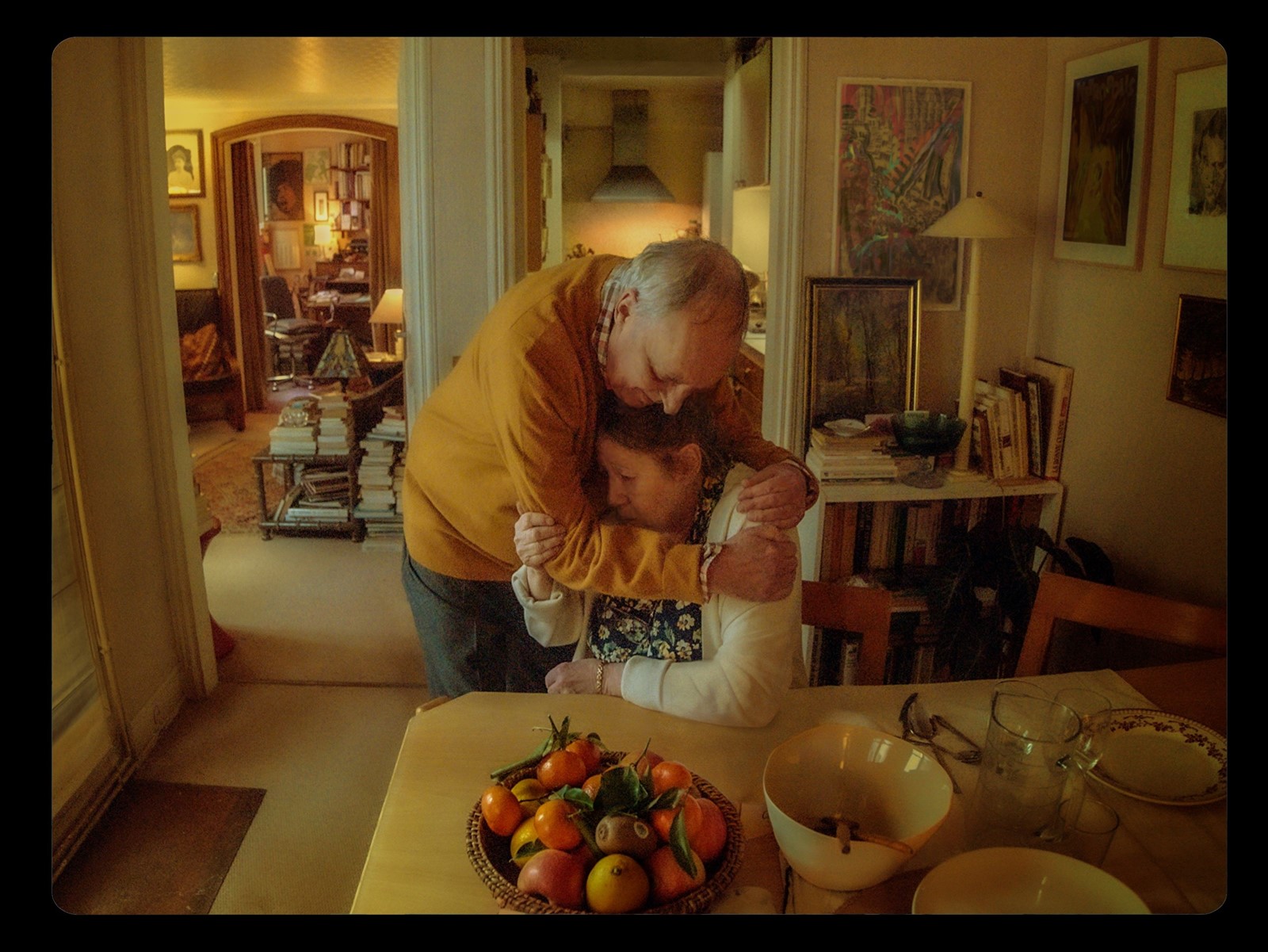
AD: It’s interesting because even when the two screens seem to present a unified picture, they’re never quite aligned. So you get this odd moment where Dario’s character reaches over the table to his wife and his arms look unnaturally long.
GN: That shot was an accident because I didn’t expect the actress Françoise Lebrun to cry during the [scene]. I was really moved; I felt some tears behind the camera. And Dario just moved his hand towards her to calm her down. When we were editing we found out that effect, which was so great, but it was an accident.
AD: Françoise, can you take us through that scene?
FL: Yes, it was unbearable. I just wondered what could that woman do with that noise? If I were in a normal mood I could say, ‘Stop it, take your cars and play outside.’ But I thought, ‘This woman cannot do that.’ And [the crying] was not expected at all. It was not a conscious reaction. And the best thing that happened to me was to abandon my conscience.
AD: The film begins with a video of Françoise Hardy singing Mon Amie la Rose, which is really beautiful. Where did the idea come from?
GN: She’s so gorgeous in that [video] and the song is so touching. We were testing music for the balcony scene, and I asked my editor to take [that song] from YouTube. And he imported this video made for Swiss TV to get the music, but when I saw the image I couldn’t believe how beautiful it was. So I said, ‘Hey, instead of putting the music on the balcony scene, why don’t we just put the whole video inside the movie?’ And it made sense. It was like the last idea. But once again, it was an accident.
AD: Françoise has been in the news recently talking about assisted suicide. Is this a subject you feel strongly about?
GN: If people want to die of course they should be helped to die. In France it’s still not legal, so when people want to have an assisted death they mostly go to Switzerland or Belgium. And that’s one of the things that Françoise talks about, you know, ‘When I want to die [I should be able to die] in my own country; I can’t see why I should have to move to another country.’
AD: Is there still a lot of resistance to the idea in France?
GN: There’s resistance from the Catholic groups, but also among doctors. When my mother was sick, we didn’t know how to deal with her suffering. But what doctors always say is we came to this profession to save lives, not to kill people. So many of them don’t want to participate in euthanasia. But having seen this from up close, it’s evident that when people cannot be saved, at least they should be helped not to suffer.
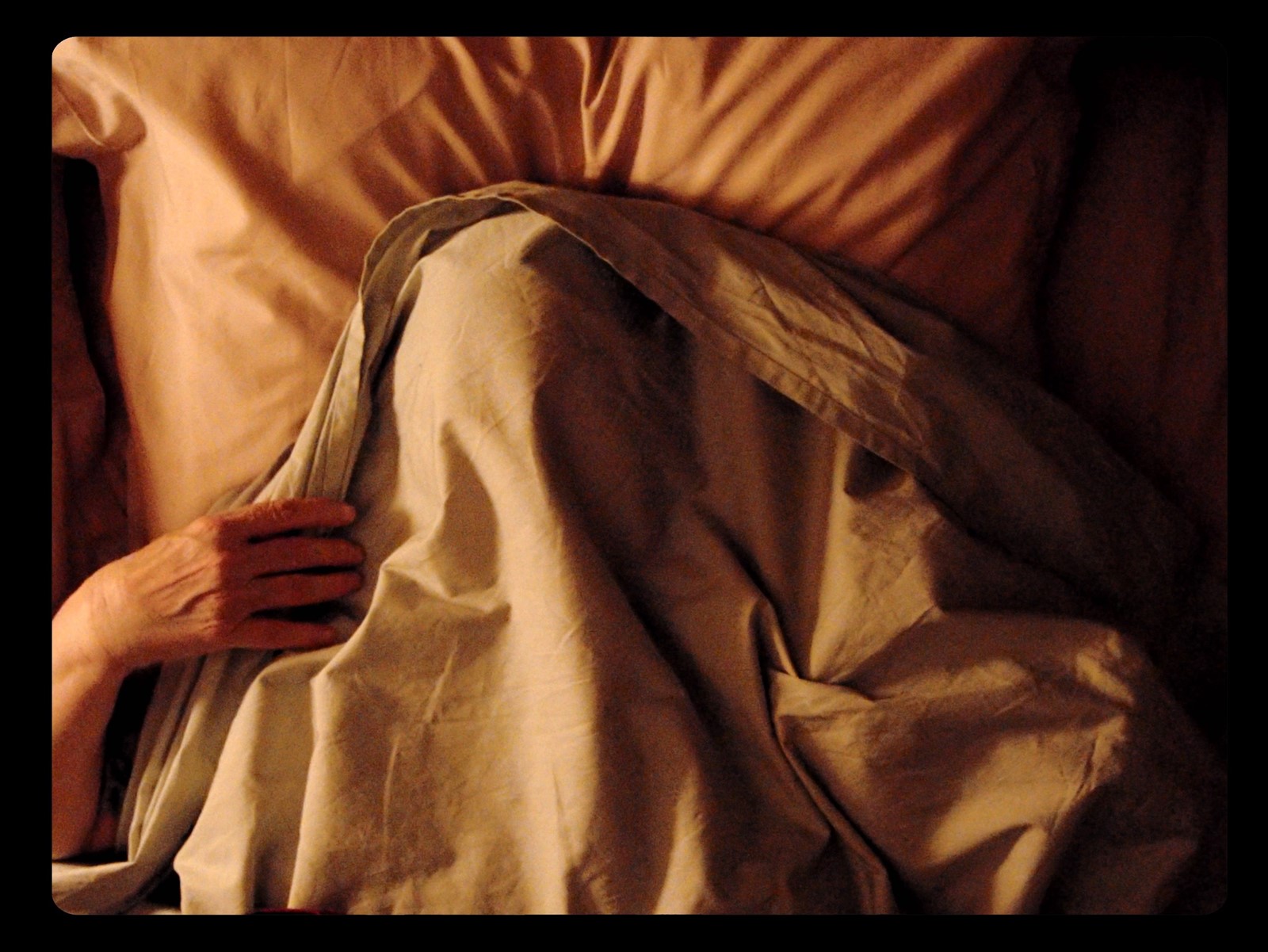
AD: I love the ending of the film, with the empty spaces. It was moving.
GN: Because their lives are erased. You always think that after someone is dead, they leave behind some footprints, but it’s like the footprints are being erased just a few days after they’re gone.
AD: That’s pretty bleak, isn’t it?
GN: It’s realistic. There’s one small detail, you probably didn’t catch it. But among the things on the floor that are going directly to the garbage at the end, there [are the manuscripts for the book] that Dario’s character has been working on, Psyche. It’s there on the floor! [laughs]
AD: The ‘death mask’ shots in the film are an interesting choice. They remind me of those Victorian photos of dead family members ‘posing’ next to their surviving relatives, which people used to keep as mementos. It seems creepy now but I guess that’s how they rolled back then.
GN: You know in some cemeteries people don’t put photos on the [headstones], they put a small screen with a loop of someone walking or whatever. That’s so creepy.
AD: Would you like that for yourself?
GN: No! Once I’m gone I wanna be burned. I want my ashes to disappear in the ocean or the river or the wind.
Vortex is in UK and Irish cinemas now.
